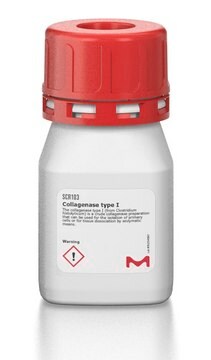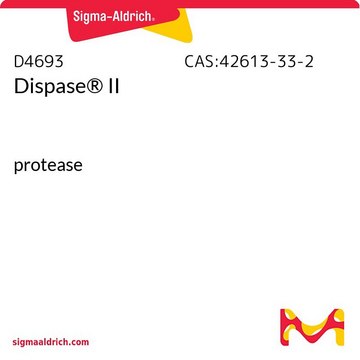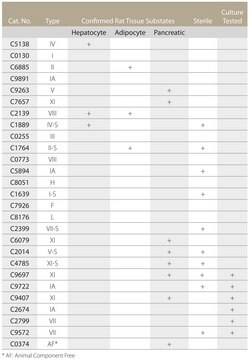C2-BIOC
Collagenase Type II, Cls II
Synonyme(s) :
Collagen A
Se connecterpour consulter vos tarifs contractuels et ceux de votre entreprise/organisme
About This Item
Code UNSPSC :
12352204
Nomenclature NACRES :
NA.78
Produits recommandés
Vous recherchez des produits similaires ? Visite Guide de comparaison des produits
Description générale
Collagenase Type II (Cls II) is one of the main tissue dissociation enzymes produced by Clostridium histolyticum. It aids to digest the smaller collagen fragments produced by Type I collagenase. Collagenases, a member of the matrix metalloproteinase (MMPs) family, digests collagen in the extracellular matrix (ECM). Collagens are triple helix structural proteins comprising three collagen polypeptides with high tensile strength.
This product is identical to Biochrom GmbH part numbers C2-22 and C2-28. Enzyme blending from collagenase, clostripain, with tryptic and proteolytic activities from Clostridium histolyticum. This preparation shows a high clostripain activity with the tryptic activity close to type I. Suitable for liver, bone, thyroid, heart, and salivary gland tissue. Specific activity is 125 to 250 Mandl units per milligram of powdered substance.
Application
Collagenase Type II (Cls II) has been used:
- as a component of Roswell park memorial Institute (RPMI)-1640 media to digest hepatic tissues
- to perfuse murine heart for the isolation of epicardial stromal cells (EpiSC)
- to digest collagenase and inject it into the intrarenal aorta abdominalis to perfuse the kidneys
Faites votre choix parmi les versions les plus récentes :
Certificats d'analyse (COA)
Lot/Batch Number
Désolés, nous n'avons pas de COA pour ce produit disponible en ligne pour le moment.
Si vous avez besoin d'assistance, veuillez contacter Service Clients
Déjà en possession de ce produit ?
Retrouvez la documentation relative aux produits que vous avez récemment achetés dans la Bibliothèque de documents.
Tissue dissociation enzymes for adipose stromal vascular fraction cell isolation: a review
Lockhart RA, et al.
Journal of stem cell research & therapy (2015)
Lukas Peintner et al.
Autophagy, 17(9), 2384-2400 (2020-09-25)
Mutations in the PKD1 gene result in autosomal dominant polycystic kidney disease (ADPKD), the most common monogenetic cause of end-stage renal disease (ESRD) in humans. Previous reports suggested that PKD1, together with PKD2/polycystin-2, may function as a receptor-cation channel complex
Notre équipe de scientifiques dispose d'une expérience dans tous les secteurs de la recherche, notamment en sciences de la vie, science des matériaux, synthèse chimique, chromatographie, analyse et dans de nombreux autres domaines..
Contacter notre Service technique






